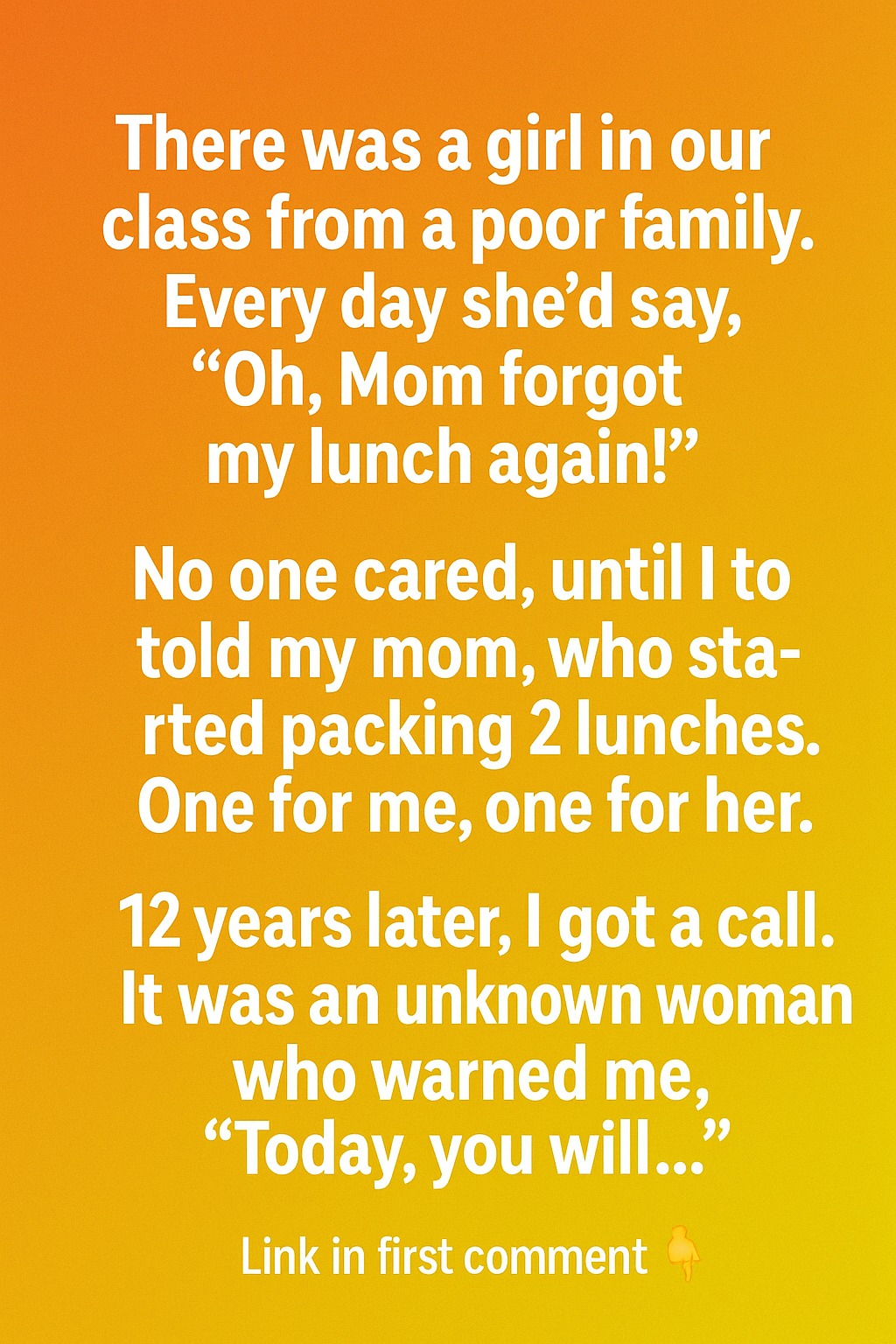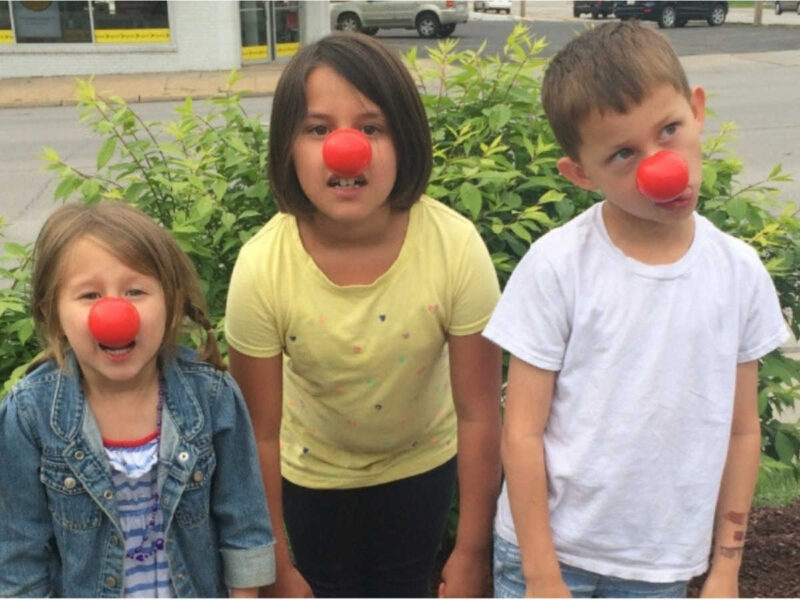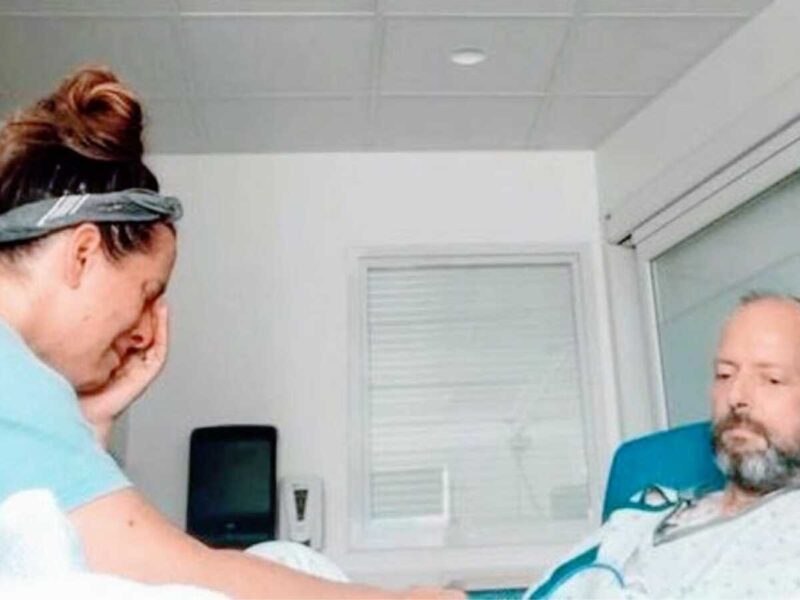I can still see her shy smile as clearly as if it were yesterday. She sat two rows over in our fifth-grade classroom—quiet, polite, the kind of girl teachers described as “sweet but reserved.” She laughed softly at other people’s jokes but rarely spoke unless someone spoke to her first. Every day at lunchtime, when the bell rang and the room filled with the rustle of lunchboxes and the smell of peanut butter sandwiches, she’d sit at her desk pretending to search through her bag. Eventually, she’d sigh and murmur the same words, “My mom forgot again.”
Most kids didn’t notice. Maybe they were too busy trading cookies or showing off the newest lunchbox toy. But I did notice. There was something about the way she said it—not angry, not embarrassed, just quietly accepting—that made my stomach twist. That night, I told my mom about it. She didn’t ask many questions, just listened, nodded, and said, “Tomorrow, take this too.” The next morning, she packed two lunches—one for me, and one “just in case.”
From that day on, it became our unspoken routine. When the lunch bell rang, I’d hand her the extra bag without making a big deal of it, and she’d give me that same grateful half-smile before we started talking about whatever fifth graders thought was important—movies, math homework, or what we wanted to be when we grew up. She wanted to be a teacher. I said I wanted to build airplanes.
Over time, she stopped pretending to search her bag. She’d just wait for me to pull out the second lunch, and we’d eat together like it had always been that way. Sometimes she’d bring me little things in return—a pencil she’d decorated, a folded note that said “You’re funny,” or a friendship bracelet made of string that kept unraveling but that I wore anyway.
That year passed, and so did the next. We drifted into different classes, new friends, new interests. By high school, we’d lost touch entirely. Life moved fast—college applications, part-time jobs, first heartbreaks. She was just a small, warm memory in the blur of growing up. Still, every so often, she’d cross my mind. I’d wonder how she was, whether she still smiled the same way, whether life had been kind to her.
Twelve years later, I got a call from a number I didn’t recognize. I almost didn’t answer—it was a hectic Thursday, and I was buried in work—but something made me pick up. A gentle, slightly nervous voice said my name. “Hey… it’s me,” she said. I paused, confused, until she added, “From fifth grade. You probably don’t remember me.”
I remembered immediately. I could hear the shy smile in her voice even after all those years.
She told me she had spent weeks trying to track me down. “I just wanted to say thank you,” she said, her voice trembling slightly. “You probably don’t realize what those lunches meant to me.”
I sat back in my chair, caught off guard. She explained that her family had been going through a rough time back then. Her dad had left, her mom was working two jobs, and most days there just wasn’t enough food to go around. “My mom was too proud to ask for help,” she said quietly. “So when I said she forgot, it wasn’t true. There was just nothing to pack.”
She paused for a moment before continuing. “You probably thought you were just sharing lunch with a classmate. But to me, it was more than that. You made me feel seen. You made me feel like I mattered.”
Her words sank in, heavy and humbling. I’d never thought of it that way. I was just a kid who noticed another kid didn’t have lunch. I hadn’t realized that such a small act could carry so much weight.
She told me that after finishing college, she’d gone into social work. A few years later, she started a local program that provided free lunches to kids in low-income schools. “I guess you could say it started with you,” she said, laughing softly. “I kept thinking about how that one simple thing changed my days. I wanted to pass that feeling forward.”
For a long moment, I couldn’t speak. I felt a lump forming in my throat, the kind that makes you wish you could go back and tell your younger self just how much the smallest gestures can matter.
We talked for almost an hour—about her work, about her family, about the old classroom we’d both forgotten until that day. She said she still remembered the smell of the cafeteria and the squeak of sneakers on the hallway floor. I could almost see it too.
When we finally said goodbye, she ended the call with a line that stayed with me. “You didn’t just share food,” she said softly. “You shared hope.”
After the call ended, I sat there for a long time staring out the window, letting her words sink in. Hope. I’d never connected that word to what I’d done, but she was right. Back then, it wasn’t about food—it was about connection, about the quiet kind of kindness that doesn’t ask for thanks or recognition.
I thought about how easily I could have missed it. If I hadn’t noticed her empty desk, if I’d been too shy to speak up, if my mom hadn’t thought to pack that extra lunch—so many little choices that, together, had changed the trajectory of another person’s life.
In a world that often glorifies grand gestures and loud heroics, it’s easy to forget the power of something as simple as sharing a meal. We underestimate how deeply small acts of compassion can take root in someone else’s story. What feels like a passing moment to one person might be a turning point for another.
A few weeks after our conversation, she sent me a photo. It showed a group of smiling kids sitting in a school cafeteria, each with a brown paper bag in front of them. On every bag, written in marker, were the words: “You matter.” She told me that’s what she writes on every lunch her organization gives out—because that’s what she’d needed to hear back then, and what she felt when I handed her that extra lunch all those years ago.
Looking at that photo, I realized something simple but profound: kindness multiplies. You may never see where it goes or who it touches, but it doesn’t vanish. It travels, changes shape, finds new hands, and keeps moving forward.
That realization changed me. It reminded me that empathy isn’t a transaction—it’s an investment. You give it freely, not to receive something back, but because somewhere down the line, it will keep someone else standing when life feels impossible.
Now, whenever I see a kid sitting alone at lunch, or someone quietly struggling where others don’t notice, I remember her. I remember the fifth-grade classroom, the extra lunch, and the phone call twelve years later that reminded me that compassion—no matter how small—can echo through an entire lifetime.
Sometimes, the things we do without thinking are the ones that matter most.


